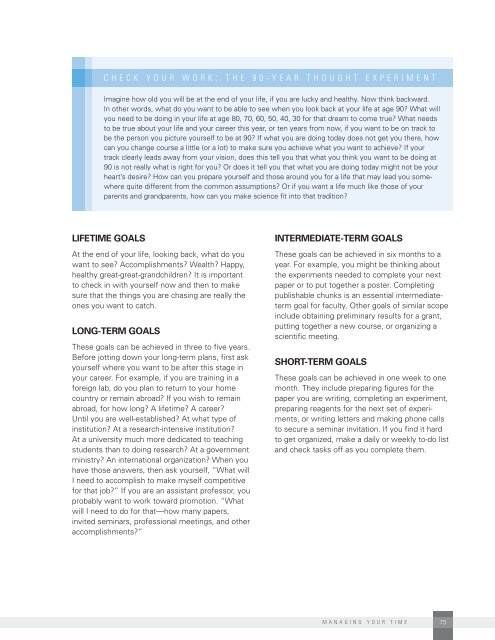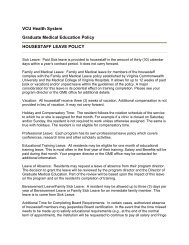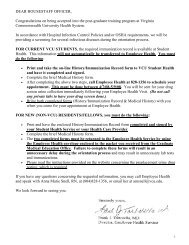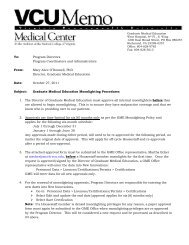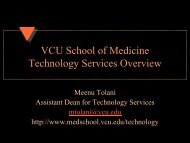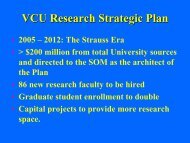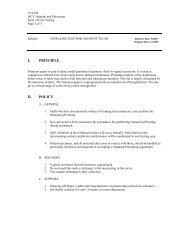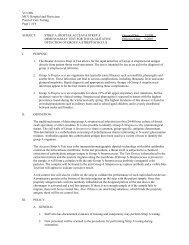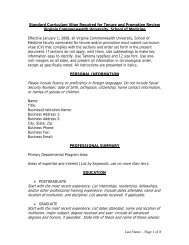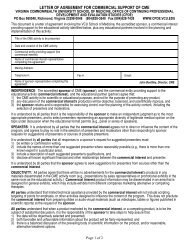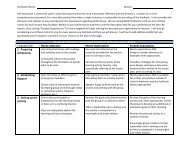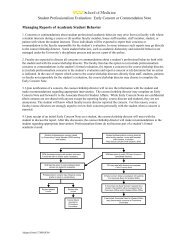If you have left your own country to train, on yourre-entry you may go from being a trainee to beinga leading expert in your field, or you may comeback and find yourself relatively low in the peckingorder among the trained scientists at your institution.Before you even have a chance to set upyour own lab, you may be pulled away by travel,sitting on panels, or advising other colleagues.Similarly, if you have trained in your own countryand now have been promoted to new responsibilities,or moved to a new institution, you will facenew challenges.Many returning scientists come home to substantialdemands from extended families who havemade large sacrifices and have placed great hopein their success. The needs <strong>of</strong> parents, siblings,grandparents, aunts, uncles, and communitieswho have made such an investment in one’scareer are very important, but these needs canalso create large time demands. In the end, tryingto build a successful career at the expense <strong>of</strong> thethings that make life worthwhile does not work.Even though you will have to work very hard whenyou are an early career scientist, you also need topreserve time and energy for the other things thatare important to you.Finding ways to manage all <strong>of</strong> these demandscan be a challenge for a scientist starting out in acareer. This chapter discusses planning strategiesthat are critical for successful time management,such as defining long- and short-term goals andsetting priorities. Tips for day-to-day time managementare also presented. The chapter also <strong>of</strong>fersguidance on managing institutional committeeservice commitments, balancing research andteaching, and juggling the demands <strong>of</strong> home andwork. In addition, it covers some issues specificto physician-scientists, who may also need to bespending considerable time in the clinic and maybe called on frequently to help family and friendsget appropriate health care.Strategies for PlanningYour ActivitiesDefining GoalsPlanning is a process that starts with a goal. Onceyou have set a goal, you can identify the stepsnecessary to move toward it. Goals come indescending sizes, each <strong>of</strong> which informs the next:long-term goals (years), intermediate-term goals(months), and short-term goals (weeks and days).Long-term goals are likely to be a combination <strong>of</strong>tangibles (e.g., promotions within your institute,service to the government, service at a high levelto an international organization such as the WorldHealth Organization or the Pan American HealthOrganization) and intangibles (e.g., a satisfyingpersonal life and the various milestones thatdefine such a thing for you) that may change overtime, making goal-setting an ongoing process thatyou should revisit periodically. In defining yourlong-term goals, you are also defining yourself—who you want to be, and how you want to beperceived.Intermediate-term goals, such as publishing apaper, are <strong>of</strong>ten composed <strong>of</strong> many short-termobjectives, such as preparing figures and writingtext. Short-term goals are the ones written onyour weekly and monthly calendars—the small,concrete, finite tasks that can swallow your time.Getting from Here to ThereTake the time to craft a formal plan, beginningwith your long-term goals. Then set interim goalsalong the way that are realistic indicators <strong>of</strong>progress. By setting achievable goals, you avoidhaving too much to do and not knowing where tobegin. Accomplishing just one goal can serve as apowerful motivator to tackle the next goal.Write down all <strong>of</strong> your goals, with each achievementtied to a specific time frame. Putting yourideas into words can help refine your thinking andprovide a concrete checklist to keep you on target.Every so <strong>of</strong>ten, take a look at your plans, reflecton them, and revise them as appropriate to changingcircumstances. Priorities shift; be prepared toreevaluate yours, but also to defend them.72 excellence everywhere
Check your work: the 90-year thought experimentImagine how old you will be at the end <strong>of</strong> your life, if you are lucky and healthy. Now think backward.In other words, what do you want to be able to see when you look back at your life at age 90? What willyou need to be doing in your life at age 80, 70, 60, 50, 40, 30 for that dream to come true? What needsto be true about your life and your career this year, or ten years from now, if you want to be on track tobe the person you picture yourself to be at 90? If what you are doing today does not get you there, howcan you change course a little (or a lot) to make sure you achieve what you want to achieve? If yourtrack clearly leads away from your vision, does this tell you that what you think you want to be doing at90 is not really what is right for you? Or does it tell you that what you are doing today might not be yourheart’s desire? How can you prepare yourself and those around you for a life that may lead you somewherequite different from the common assumptions? Or if you want a life much like those <strong>of</strong> yourparents and grandparents, how can you make science fit into that tradition?Lifetime goalsAt the end <strong>of</strong> your life, looking back, what do youwant to see? Accomplishments? Wealth? Happy,healthy great-great-grandchildren? It is importantto check in with yourself now and then to makesure that the things you are chasing are really theones you want to catch.Long-term goalsThese goals can be achieved in three to five years.Before jotting down your long-term plans, first askyourself where you want to be after this stage inyour career. For example, if you are training in aforeign lab, do you plan to return to your homecountry or remain abroad? If you wish to remainabroad, for how long? A lifetime? A career?Until you are well-established? At what type <strong>of</strong>institution? At a research-intensive institution?At a university much more dedicated to teachingstudents than to doing research? At a governmentministry? An international organization? When youhave those answers, then ask yourself, “What willI need to accomplish to make myself competitivefor that job?” If you are an assistant pr<strong>of</strong>essor, youprobably want to work toward promotion. “Whatwill I need to do for that—how many papers,invited seminars, pr<strong>of</strong>essional meetings, and otheraccomplishments?”Intermediate-term goalsThese goals can be achieved in six months to ayear. For example, you might be thinking aboutthe experiments needed to complete your nextpaper or to put together a poster. Completingpublishable chunks is an essential intermediatetermgoal for faculty. Other goals <strong>of</strong> similar scopeinclude obtaining preliminary results for a grant,putting together a new course, or organizing ascientific meeting.Short-term goalsThese goals can be achieved in one week to onemonth. They include preparing figures for thepaper you are writing, completing an experiment,preparing reagents for the next set <strong>of</strong> experiments,or writing letters and making phone callsto secure a seminar invitation. If you find it hardto get organized, make a daily or weekly to-do listand check tasks <strong>of</strong>f as you complete them.managing your time73
- Page 3 and 4:
A R e s o u r c e f o r S c i e n t
- Page 5 and 6:
Table of ContentsVII119PrefaceChapt
- Page 7:
135 Chapter 10E x p a n d i n g Y o
- Page 15 and 16:
Q u e s t i o nq&aWhat Is a “Tenu
- Page 17:
preparing for immediate submission,
- Page 22 and 23:
Practicing the Talkn Practice your
- Page 24 and 25:
your one-on-one interviews you have
- Page 26 and 27:
If talking directly about money is
- Page 28 and 29:
When the institution responds and y
- Page 30 and 31:
equipment and supplies. Maintenance
- Page 32 and 33: Q u e s t i o nq&aIs your instituti
- Page 34 and 35: Working With Human SubjectsWhether
- Page 36 and 37: RESPONSIBILITIES BEYONDTHE LABORATO
- Page 38 and 39: UNDERSTANDING YOURINSTITUTION AND H
- Page 40: Criteria for PromotionStructure of
- Page 45 and 46: Q u e s t i o nWhat’s in a Name?q
- Page 47 and 48: Screening ApplicantsWhen you review
- Page 50 and 51: Interpersonal Skillsn How important
- Page 52 and 53: Multinational Organizations are hir
- Page 54 and 55: n If there is an office that handle
- Page 57 and 58: n Seek funding and publish papers (
- Page 59 and 60: In fact, even though you yourself h
- Page 61 and 62: n Craft a statement that you feel c
- Page 63 and 64: n When you delegate authority to so
- Page 65 and 66: n Use only pens, preferably with wa
- Page 67 and 68: Strategy sessionsShould you decide
- Page 69 and 70: Finding Good Papers for Journal Clu
- Page 71 and 72: If possible, invite people in your
- Page 73 and 74: Q u e s t i o nq&aHow do I avoid po
- Page 75 and 76: The International Committee of Medi
- Page 77 and 78: Managing Conflictin the LabConflict
- Page 79 and 80: steps for dealing with conflictWhen
- Page 81: chapter 5managing your time“ Succ
- Page 85 and 86: n Make and keep appointments with y
- Page 87 and 88: n Help them seek advice without tak
- Page 89 and 90: FAMILY MATTERSMany scientists face
- Page 91 and 92: chapter 6project management“ We m
- Page 93 and 94: My project is to get a grant funded
- Page 95: ObjectivesObjectives are the end re
- Page 98 and 99: The key events schedule and the act
- Page 100 and 101: Microsoft Project, a program that s
- Page 102 and 103: Martin, Vivien. Managing Projects i
- Page 104 and 105: appendix II: Example of a Work Brea
- Page 106 and 107: appendix iv: Example of a Gantt Cha
- Page 108 and 109: e h i n d c l o s e d d o o r s :w
- Page 110 and 111: Who might be interested in supporti
- Page 112 and 113: Call your program officerProgram of
- Page 114 and 115: direct costs vs. indirect costsDire
- Page 116 and 117: RESOURCESAllen, Ernest M. “Why ar
- Page 118 and 119: the next generation of students (th
- Page 120 and 121: Seek Feedback through a Formal Peer
- Page 122 and 123: Encouraging Student Questionsn Do n
- Page 124 and 125: Here are some ways you can help the
- Page 126 and 127: n Are there curriculum changes unde
- Page 128 and 129: a relaxed format for talking about
- Page 130 and 131: spend in preparing an effective cou
- Page 132 and 133:
The Publishing ProcessTypes of Jour
- Page 134 and 135:
A word about impact factorsThe impa
- Page 136 and 137:
C r e a t i n g a n i n t e g r a t
- Page 138 and 139:
may need to take the first author p
- Page 140 and 141:
submitting image filesToday, most i
- Page 142 and 143:
Submitting your Paper to Another Jo
- Page 144 and 145:
RESOURCESDavis, Martha. Scientific
- Page 146 and 147:
increase your impact as a scientist
- Page 148 and 149:
Q u e s t i o nq&aHow do I communic
- Page 150 and 151:
n Offer criticism and correction in
- Page 152 and 153:
It is important to discuss career g
- Page 154 and 155:
When Mentoring,Advisory, or Supervi
- Page 156 and 157:
For researchers in developing count
- Page 158 and 159:
n Is travel safe and convenient, or
- Page 160 and 161:
n The expected contribution of each
- Page 162 and 163:
Meetings. Set up systems to ensure
- Page 164 and 165:
SPECIAL CHALLENGESFOR THE BEGINNING
- Page 166 and 167:
e an important connection to future
- Page 168 and 169:
The invention of a new method or pr
- Page 170 and 171:
licensee, who can charge others for
- Page 172 and 173:
Most profound for developing countr
- Page 174 and 175:
Finally, the patents have been chal
- Page 176 and 177:
And, India benefited as a supplier
- Page 178 and 179:
paperwork involved in purchasing1.
- Page 180 and 181:
labeling mattersA case in point: In
- Page 182 and 183:
equipment, freeze-drying equipment,
- Page 184 and 185:
Responsibilityfor materialsIf an or
- Page 186 and 187:
Recent Improvementsin Materials Tra
- Page 188 and 189:
“Knowledge is power.” —Sir Fr
- Page 190 and 191:
MOUMemorandum of UnderstandingRFPRe
- Page 192 and 193:
notes continued182 excellence every
- Page 194:
notes continued184 excellence every


